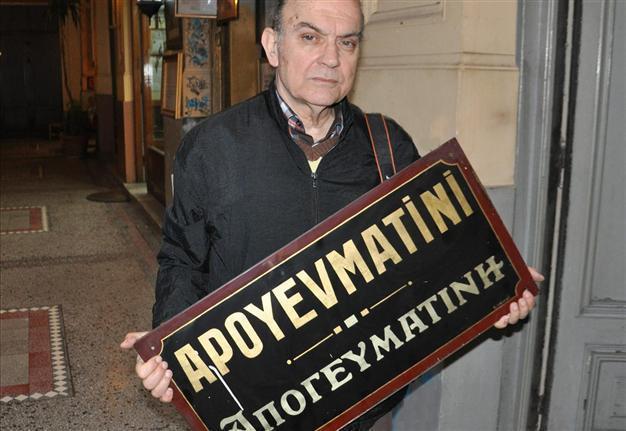Historical Greek daily in Turkey to close office, but editor vows to keep going
ISTANBUL

Mihail Vasiliadis has already taken down Apoyevmatini's signboard from its historic office in Istanbul.
A historical Greek language newspaper in Turkey, Apoyevmatini, is set to close its office in Istanbul, which has housed it throughout its entire 90-year history. However, despite no longer being able to cover the rent with its tiny circulation of only 600, Apoyevmatini’s chief – and only – editor, Mihail Vasiliadis, has vowed to continue issuing the four-page daily from his home.“I resist, therefore I am alive. Why wouldn’t I resist? While we are here talking, there are a handful of people resisting thousands on our border,” the 75-year-old Vasiliadis told news website Bianet, referring to Kurds fighting against the Islamic State of Iraq and the Levant (ISIL) across the border in northern Syria.
Apoyevmatini is an iconic daily that sold tens of thousands of copies in the 1920s, but Vasiliadis sought to downplay the significance of the closure of its office.
“I have not been using that office for five years anyway. I was working from home. There were times when 35 people were working there, so the office had a purpose. But now I make the newspaper with only the help of my son, which means 17-18 hours of work every day,” he said.
Museum instead of office
Vasiliadis also refuted that the daily was facing extinction due a crisis in the newspaper sector, but rather due to historical and social forces.
“Until 1964 the number of Greeks in Istanbul was over 90,000. Therefore, newspapers in Greek could exist. But with a decision issued in 1964, 13,000 people were expatriated. Within 18 months, one in three Greeks were forced to leave Turkey. Now the population of Greeks has dropped to under 30,000,” he said.
“This is our biggest problem, in other words the shrinking of our public. Our problem is not a crisis like a flu that can be cured with drugs. Our problem is, unfortunately, a very malignant cancer and there is no way that [conditions will improve],” he added.
Accepting the likely disappearance of the daily in the near future, Vasiliadis has proposed the creation of a museum and a Greek newspaper archive at the site of Apoyevmatini’s iconic location in the Syria Arcade on İstiklal Avenue to at least safeguard its memory. The building was erected by a great uncle of his, Dimitris Vasiliadis, who was also the founder of Apoyevmatini, he says.
Still, Vasiliadis doesn’t think it’s time to shutter Apoyevmatini just yet, stressing that it could survive if the means are gathered to employ an editor from Greece.
“One should not look back because then you will fall into the hole in front of you. I look forward with Apoyevmatini and try to think about what can be done for the future. I’m not even saying how nice the good old days at Apoyevmatini were. We have now left the Syria Arcade behind, but maybe my idea for a museum and archive will be realized in the end,” he said.
















